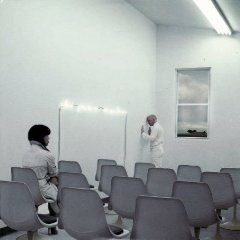When Les Rythmes Digitales, Deejay Punk-Roc and the Younger Younger 28s all showed up back in 1998 they were greeted with some critical affection but also frequently regarded as being just that little bit too retro. How absurd that assessment seems with hindsight: in fact, with ‘I’m Not Alone’, ‘Poker Face’ and ‘In For The Kill’ all currently parked vividly in the top five, it wouldn’t be at all difficult to argue that there’s nowt so now as 1981. Which, as it turns out, could scarcely be better news for John MacLean.
In fact, if we continue to apply a retrospective approach, it should’ve been obvious where he was headed musically, since it’s not too great a leap of logic to suggest that calling his collective’s not-unengaging-but-rather-uneven debut album Less Than Human might’ve been indicative of him feeling somewhat in the shadow of Oakey and chums. No shame in that – after all, the last person to bang on about the brilliance of the League in interviews was Martin Carr, and his efforts to scale those heights led to Giant Steps, one of the very best albums of the 90s. This time around, MacLean is making no effort at all to disguise their influence, with even his vocals coming across as a fine faux Phil. Consequently, ‘No Time’ is, to all intents and purposes, ‘Being Boiled’ played on a 303, a concept that thrills in practice as much as it does in theory, while ‘The Simple Life’ makes liberal use of ‘Love Action’, though, curiously, it also tips its hat coquettishly at pre-SAW Bananarama.
Fascinatingly, it’s this pick and choose approach to the sharper end of the decade du jour that ensures ‘The Future Will Come’ is constantly elevated above mere pastiche. MacLean’s continuing collaboration with Nancy Whang is, in that respect, an inspired call, since she invokes the No Wave affectations of early-80s New York, and the pair’s vocal interplay on ‘The Station’ (which again plays the nostalgic prescience card by weaving in the beats from ‘Trans-Europe Express’) pulls off the awkward trick of being simultaneously arch and affecting. Indeed there’s no shortage of inspiration to be had this time around: ‘Tonight’, for instance, combines sympathy with synthetics by drawing on a treated horn that recalls Soft Cell’s ‘Torch’ while the foundations of house burble in the background, and ‘One Day’ punctures its New Pop froideur with a dash of Italo piano magic.
But, oddly, it’s when MacLean strays nearest to this century that he really soars, as there’s an ecstatic charm to the ever-widening techno twinkles and Whang’s cries of "you are so excellent!" in ‘Happy House’ that recaptures acid’s optimism like nothing since ‘Weak Become Heroes’ and hints that, having scratched his homagery itch and gone post-post-punk, his next endeavour’ll be a more recent-inflected affair and perhaps a more straightforwardly joyous one too. Meanwhile, though, ‘The Future Will Come’ is something to savour; in aiming for ‘The Things That Dreams Are Made Of’, The Juan MacLean have produced something fantastic


